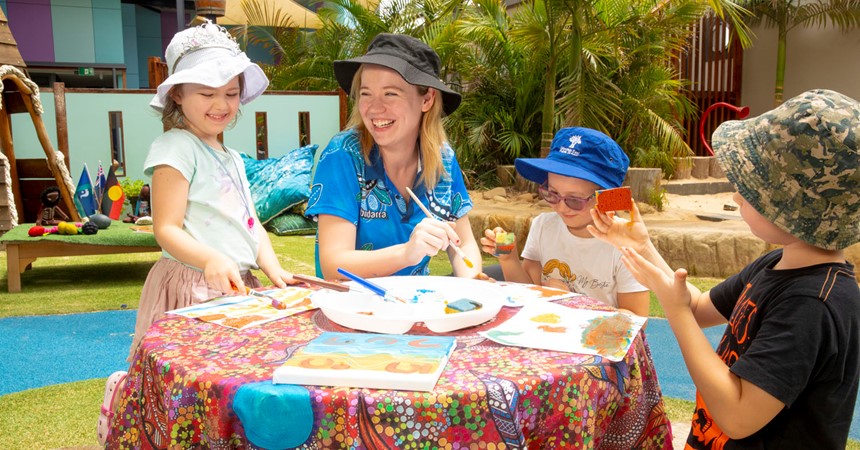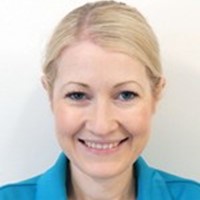We have reached out to organisations such as Miromaa Aboriginal Language and Technology Centre, and Speaking in Colour. To develop the children’s understanding of the traditional owners of this land, we engaged with local Wonnarua artist, Saretta Fielding.
During workshops early last month, Ms Fielding explained Aboriginal symbols and semiotics, local landmarks, and highlighted on a map all the Aboriginal nations.
She also showed the children a real emu egg and explained how it could be used in art. The children then used acrylic paints and wood to create their own art using colours to reflect the sand and the ocean and incorporating Aboriginal symbols.
Ms Fielding built on what the students have been learning about Aboriginal and Awabakal culture. It was good to have her perspective. They were engrossed when she explained the symbolism and provided different techniques. They were also happy to see their own finished artworks.
Yuna, who is five years of age, says she liked learning about Aboriginal culture.
“Saretta taught us about emu patterns made in the sand, which point to a place where mums could have babies,” Yuna says.
“I used white, blue yellow and red for my painting. The circle meant (represented) the woman, and the stick meant the boys.
“Aboriginals are important people. The Awabakal people made our land. They are the traditional owners. They tell us we need to respect the land, take care of it and be careful with it,” Yuna says.
The children participate in Acknowledgement of Country each day, and it is something they look forward to.
“At group time we say: ‘Here is the land, here is the sky, here are my friends and here am I. We thank the Awabakal people for the land on which we play. Hands up, hands down, we’re on Awabakal ground.’” Adelaide, who is also five years of age, said.
St Nicholas, Cardiff, has also commissioned Ms Fielding to create an artwork for our centre that reflects our vision and philosophy, and our journey of reconciliation. It will include the same symbolism that the children learned when they were guided by Fielding to create their own artwork.
We have a long way to go on the journey towards a reconciled future, and the development of our centre’s reconciliation action plan will assist us to guide students’ learning and respect for differences. All St Nicholas Early Education Centres have made the commitment to develop their own reconciliation action plan.
Over the past four months, four of our educators have participated in the Deadly Teachers Solid Jarjums program. This assists the early childhood education sector to provide quality culturally inclusive environments that support and expand on the strengths of Aboriginal and Torres Strait Islander children. St Nicholas, Cardiff, was one of 20 services selected in NSW for who were given this training opportunity.
Charlotte Nichols is one of the educators involved and said the Deadly Teachers program informed her on how to best instruct the children about Aboriginal perspectives.
“The program has also given us greater insight into our local nation, including loads of information about the Awabakal people. It is great to have that specific training – rather than just Aboriginal culture as a whole.
“There are so many Aboriginal and Torres Strait islander nations and they all have individual traditions. Even the family and kinship structures differ between each nation. That needs to be respected,” Ms Nichols said.
In collaboration with our families, children, and educators at Cardiff, we have developed a reconciliation vision statement that clearly outlines our ongoing commitment to embedding Aboriginal and Torres Strait Islander perspectives. The Vision Statement is important as it helps to embed an understanding of Indigenous culture early, so that children will develop lifelong understanding and respect.
Our vision of reconciliation at St Nicholas Cardiff, is to recognise and respect the traditional owners of our land and embed this in our educational program and practices. We recognise the past and have a commitment to move forward together. We are committed to making a better future for generations to come by breaking stigmas and barriers and we hope to work to close the gap between Aboriginal and Torres Strait Islander people and non-indigenous Australians. We will do this by educating children about the traditional owners of our land (the Awabakal people) and by embedding positive practices. We will share Aboriginal culture with our children, as shared with us by Aboriginal people. We commit to strengthen relationships between Aboriginal educators, Aboriginal families and the Aboriginal community and to build strong community connections and reciprocal relationships with the Awabakal people. We commit to ensuring all Aboriginal and Torres Strait Islander educators, families, children and community members are respected and welcome in our centre.























































































